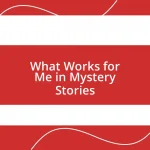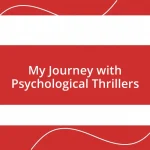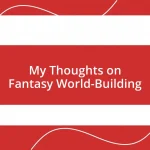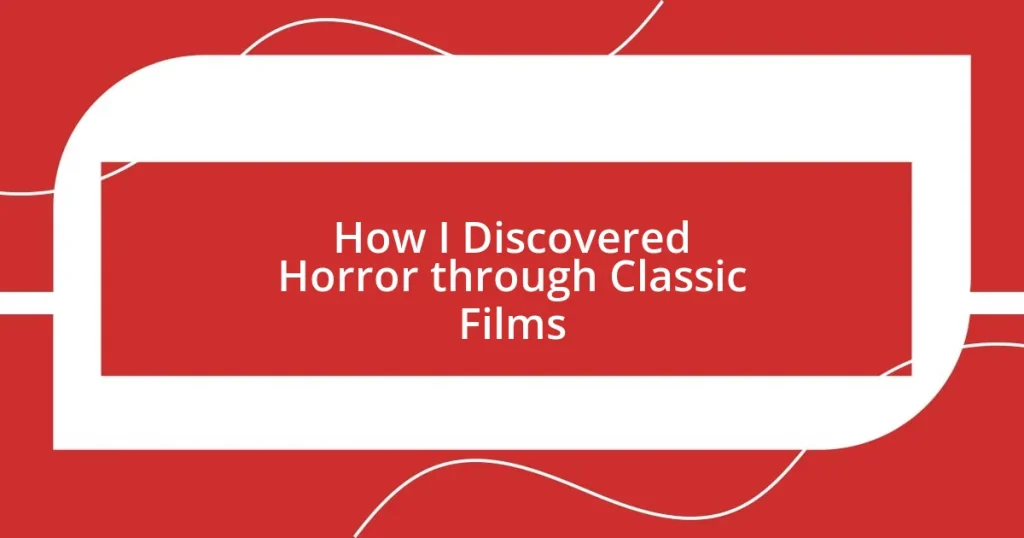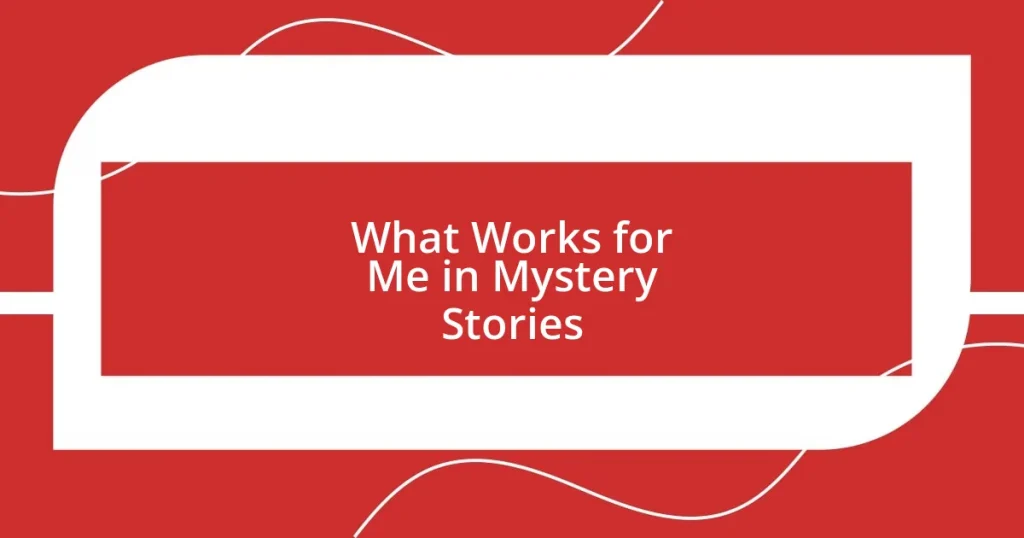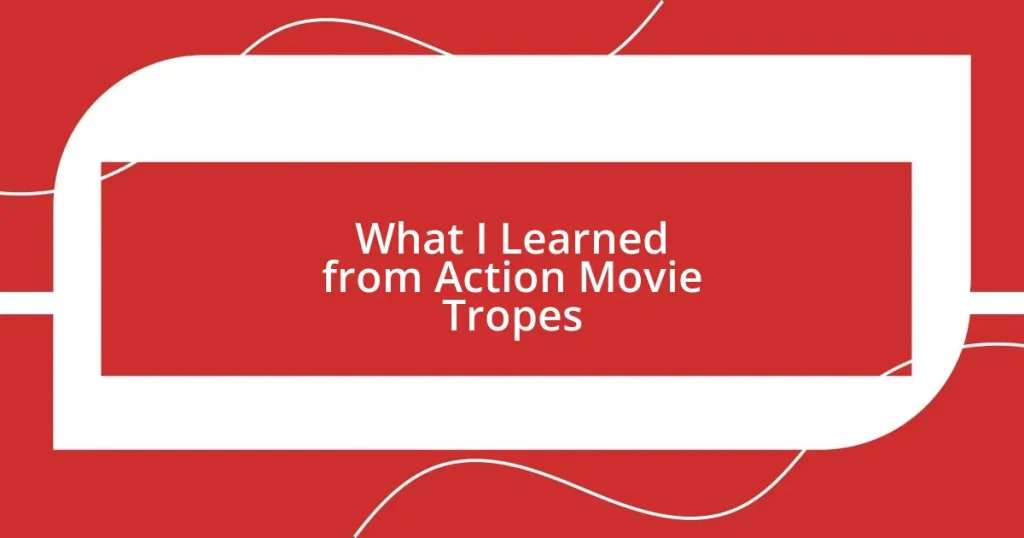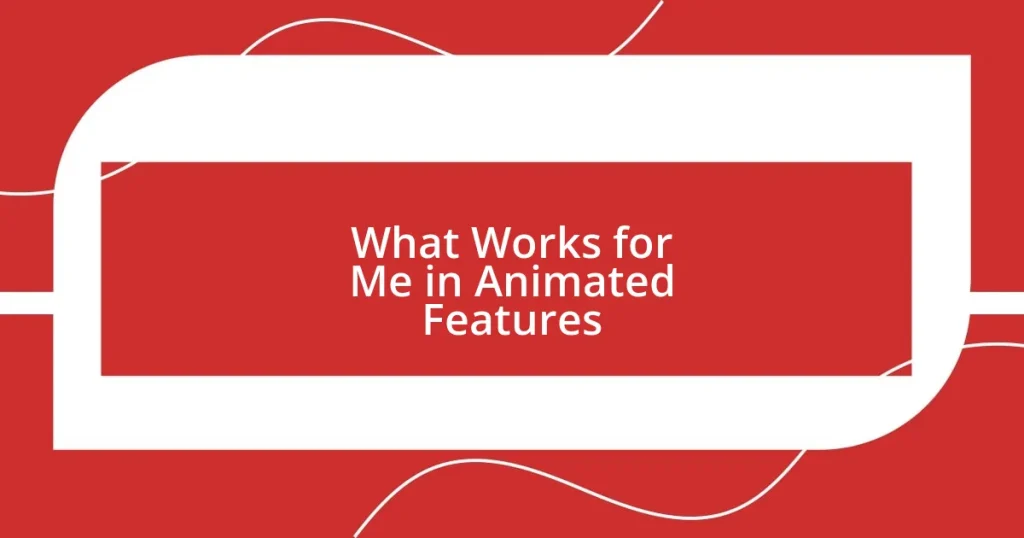Key takeaways:
- First exposure to horror films ignited a passion for the genre, highlighting its ability to evoke thrilling emotions.
- Key films like “Psycho” and “Frankenstein” emphasized the psychological depth and empathy within horror, altering perceptions of fear.
- The exploration of horror themes, such as isolation and morality, fosters introspection, making viewers reflect on their own fears and ethical dilemmas.
- Horror has significantly influenced cinema through innovative techniques, societal commentary, and compelling narratives, prompting deeper discussions about human nature.
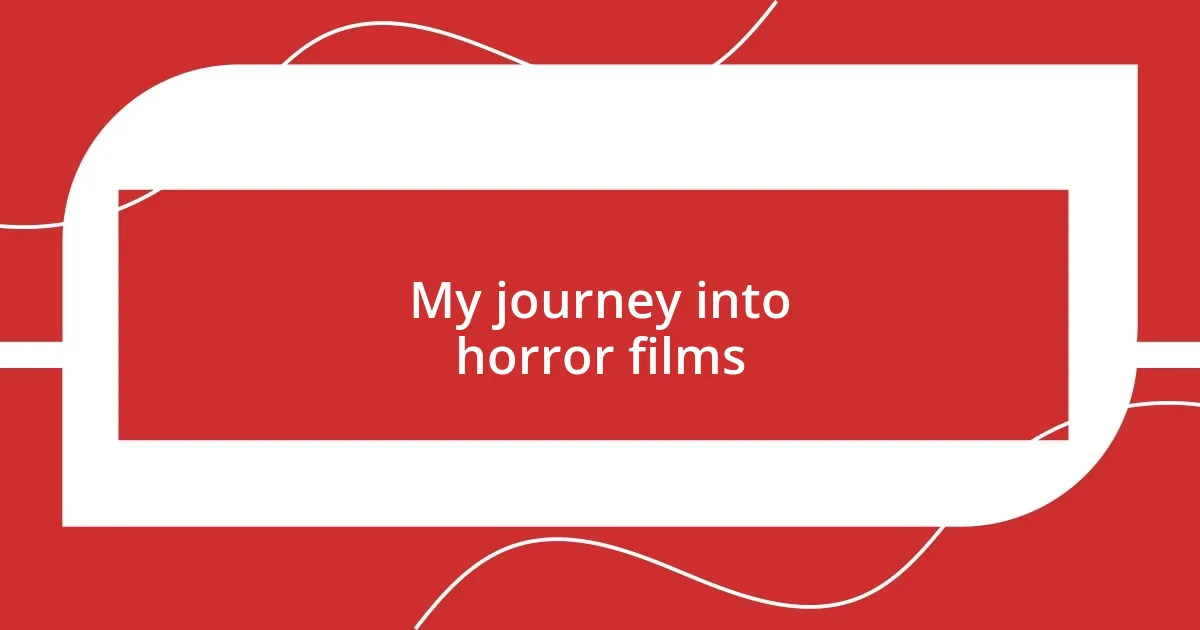
My journey into horror films
As a child, my first encounter with horror films came during a late-night movie marathon at my cousin’s house. I remember peeking from behind the couch while “The Shining” flickered eerily on the screen. It was thrilling—my heart raced, and I found myself captivated by the suspense of it all, despite feeling terrified.
In middle school, I stumbled across “Psycho,” and it opened my eyes to the psychological depth found in horror. The twist of the story left me bewildered yet fascinated. I often think: what is it about fear that can be so captivating? This film pushed me to explore other classics, revealing layers of complex narratives intertwined with deep-seated emotions.
As high school approached, I began hosting movie nights with friends, where we’d indulge in horror classics. One night, we watched “Night of the Living Dead,” and as the tension built, I felt an electrifying connection with my friends—the laughter and screams melded into a thrilling bond. Was it the fear that brought us closer? Or was it the shared exhilaration of confronting what terrifies us? Either way, those nights solidified my love for horror, igniting a passion I still cherish today.
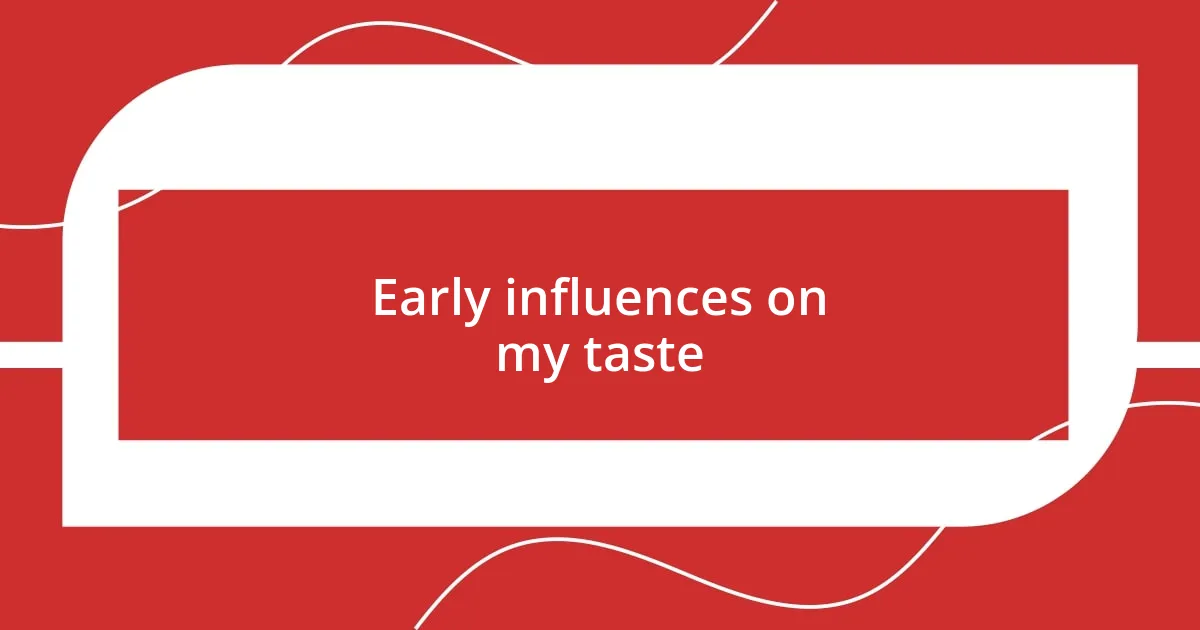
Early influences on my taste
The earliest seeds of my horror appreciation were sown by the classic tales told around campfires and in dark, shadowy corners of basements. I vividly recall listening to my uncle recount the gory details of “Nightmare on Elm Street” during a family gathering. The thrill of his storytelling, intertwined with the fear of the unknown, sparked a fascination that I couldn’t ignore.
Fast forward to my teenage years, and the discovery of “Frankenstein” at a local film festival reshaped my perception of horror. Watching Boris Karloff’s portrayal of the monster stirred a whirlwind of emotions in me, blurring the line between terror and sympathy. It struck me how horror could evoke feelings of compassion for characters often depicted as villains, making me ponder the deeper meaning behind fear itself.
In college, I took a film history class, and my professor introduced us to “Nosferatu.” The silent film’s haunting visuals and eerie soundtrack enveloped me in its world, awakening a fascination with the art of suspense. This experience deepened my desire to explore horror’s roots and its evolution over time, revealing not just frights, but profound cultural reflections as well.
| Influence | Details |
|---|---|
| Campfire Stories | Uncle’s tales sparked early fascination. |
| Frankenstein | Evoked empathy for the monster; blurred lines of fear. |
| Nosferatu | Haunting visuals ignited an interest in horror’s artistry. |
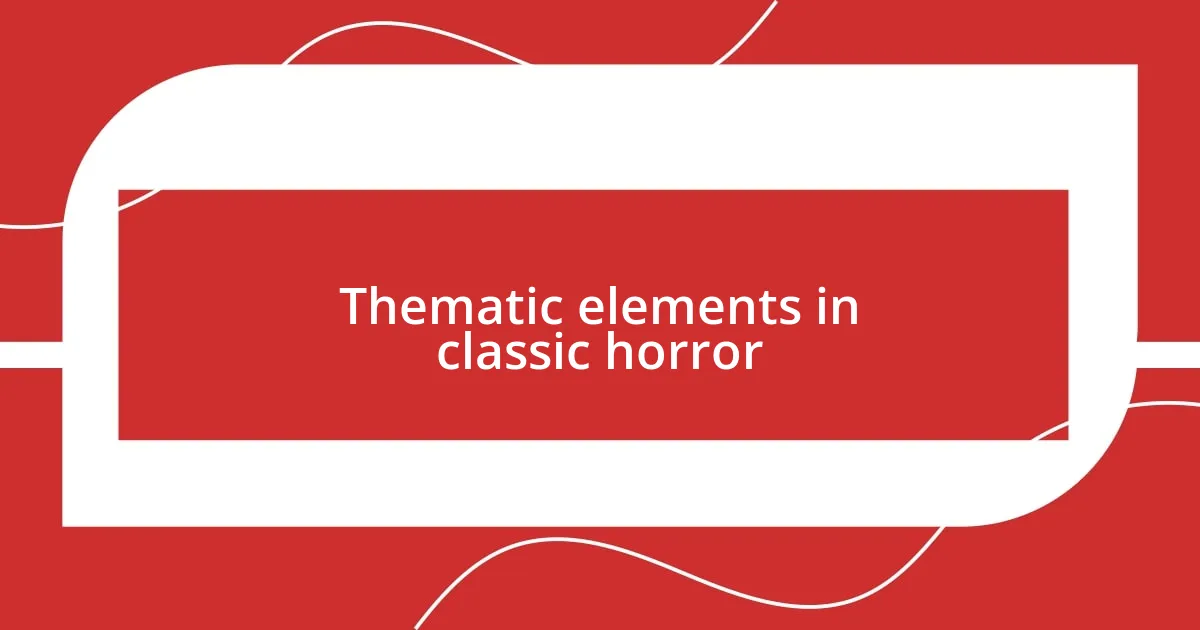
Thematic elements in classic horror
The thematic elements in classic horror films often delve into the human psyche, exploring our deepest fears and societal taboos. I remember the unsettling atmospheres in movies like “The Cabinet of Dr. Caligari,” which played with perspective and reality, making me question what was truly real. Such films often tackle themes of isolation, madness, and the consequences of human actions, creating a chilling reflection of our own complexities.
- Isolation: Characters frequently find themselves trapped, enhancing feelings of vulnerability.
- The Unknown: Classic horror thrives on the fear of what lies beyond our understanding, playing on our primal instincts.
- Morality and Consequences: Many stories serve as cautionary tales, depicting the fallout from transgressions or forbidden knowledge.
- Human Nature: The exploration of inner demons often raises ethical dilemmas, making the audience ponder their own moral compass.
These elements not only scare us but also invite introspection, allowing a dialogue between the film and its viewer. It’s this conversation that leaves a lasting impression, echoing long after the credits roll.
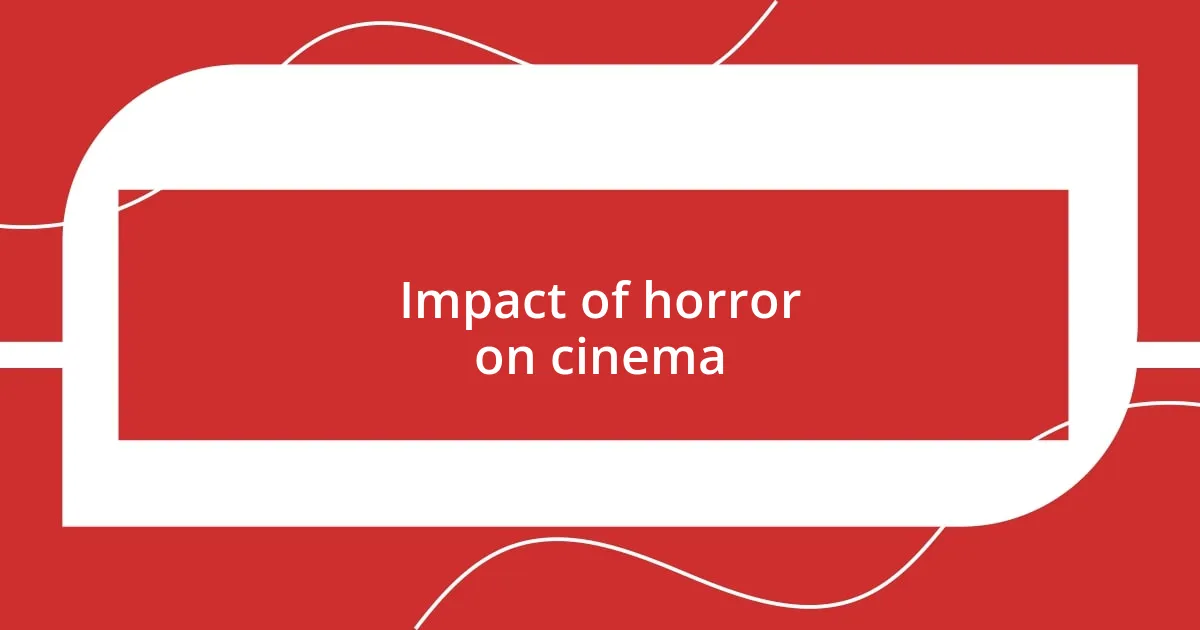
Impact of horror on cinema
The impact of horror on cinema is profound and multifaceted, influencing not only the genre but also the broader landscape of filmmaking. I often think about how iconic films like “Psycho” reshaped audience expectations. The shocking twists and psychological depth introduced by Alfred Hitchcock have become benchmarks for tension and surprise in all genres. Can you recall a film that caught you off guard, redefining how you viewed suspense? For me, those early impressions have lingered as guiding influences in my cinematic journey.
Moreover, horror has been a trailblazer for technical innovation in filmmaking. The use of practical effects in “The Thing” not only terrified audiences but pushed the boundaries of what was possible on screen. I still remember my awe the first time I saw those effects—how they made fear palpable and visceral. It made me appreciate the artistry behind filmmaking and how horror often leads the charge in exploring new techniques, creating experiences that resonate beyond the flickering screen.
The genre also sparked dialogue about societal issues, often bringing to light fears lurking beneath the surface of our cultures. Simply think about how films like “Get Out” tackle race relations through a horror lens. It’s fascinating how these movies generate conversation and reflection, isn’t it? In my view, horror not only entertains but also serves as a mirror, reflecting the anxieties of our times while challenging us to confront uncomfortable truths.
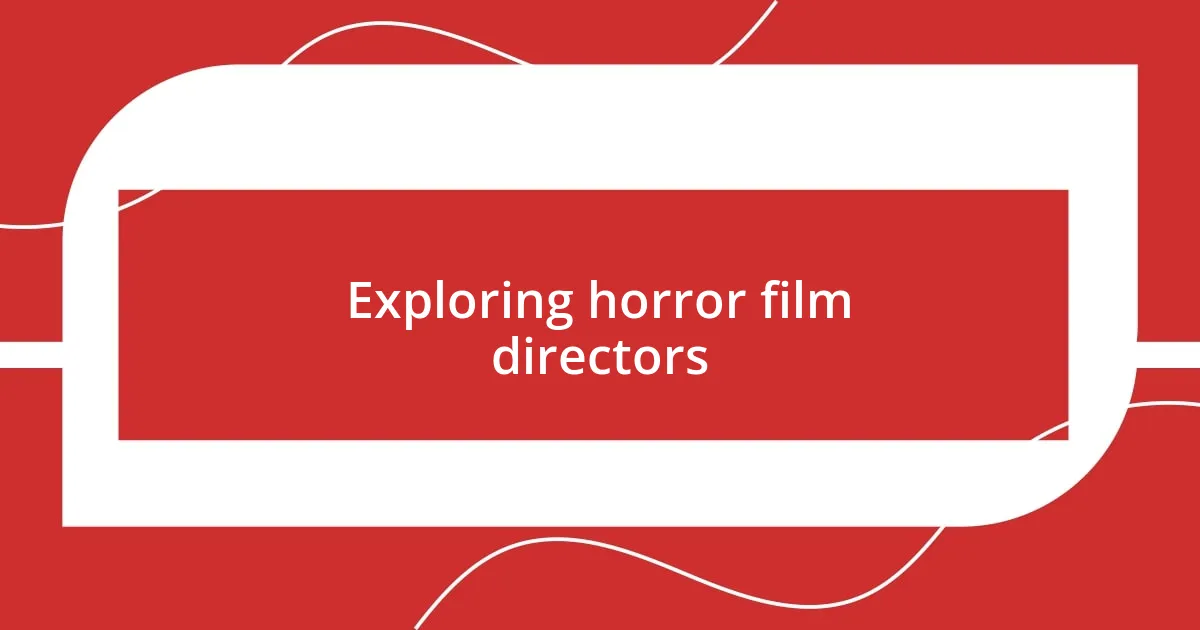
Exploring horror film directors
Exploring horror film directors opens a fascinating window into the minds behind the terror. Directors like Alfred Hitchcock and John Carpenter have mastered the art of suspense and psychological tension. I often recall how Hitchcock’s “Psycho” kept me on the edge of my seat, as he expertly crafted every scene to build dread in a way I had never experienced before.
Then there’s the visionary style of George A. Romero, who not only shaped the zombie genre but also commented on societal issues through horror. I remember watching “Night of the Living Dead” for the first time and feeling a jolt—not just from the scares but from the profound commentary on human nature and survival. Isn’t it remarkable how horror can simultaneously entertain and provoke thought?
Moreover, directors like Dario Argento, known for his colorful and surreal horror, have impacted my understanding of visual storytelling in horror. When I first encountered “Suspiria,” I was captivated by how the vibrant aesthetics complemented the chilling storyline. It made me realize how a director’s vision can elevate horror from mere fright to a hauntingly beautiful experience, shaping my appreciation for the genre.
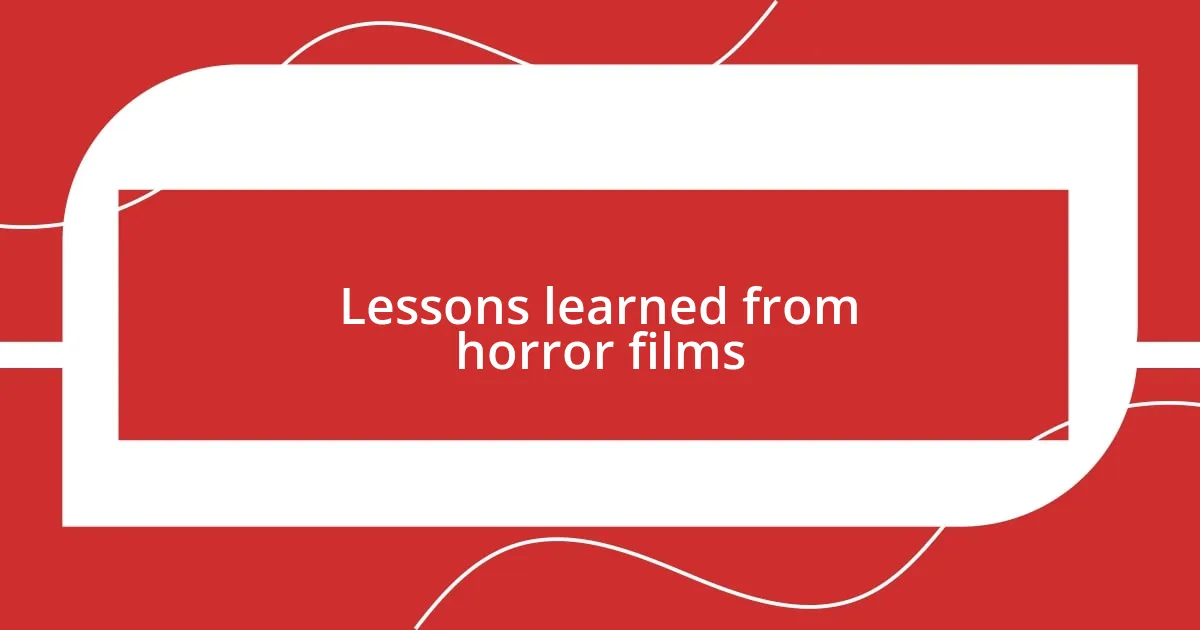
Lessons learned from horror films
Horror films teach us that fear is a universal language, often revealing our deepest vulnerabilities. I vividly remember the first time I watched “The Exorcist.” The sheer terror of possession made me reflect on how even the most faithful can grapple with doubt. Isn’t it fascinating how a film can evoke such strong emotions and prompt us to confront what we often avoid in our own lives?
One striking lesson I’ve gleaned from horror is the importance of resilience. Think back to characters who face unspeakable horrors yet find a way to endure. I often find myself rooting for final girls in slasher films, like Laurie Strode in “Halloween.” Their determination inspires me to face my fears in real life. What does it say about the power of the human spirit when confronted with unimaginable odds?
Moreover, horror films have a unique way of sparking conversations about morality and human nature. I still remember discussing the morality of the characters in “Saw” with friends after viewing it; it raised questions about justice and accountability. That experience taught me that horror can push boundaries and challenge our understanding of right and wrong. Isn’t it intriguing how a genre built on terror can provoke such profound reflections on ethics and choices?
